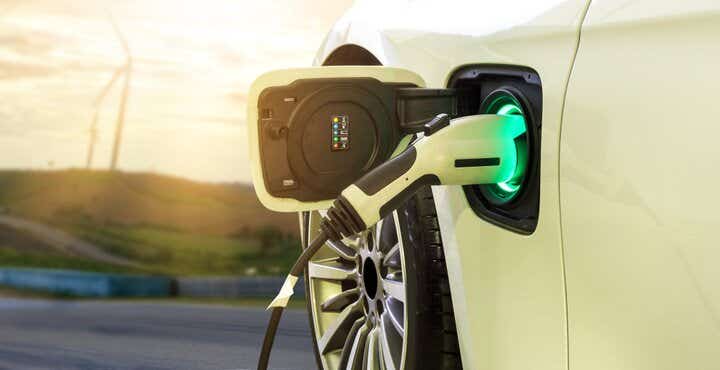Get a car insurance quote
See a range of car insurance quotes in just a few minutes when you compare with Uswitch
What is a hybrid car?
A hybrid car is one that has both an electric battery and a more ‘traditional’ petrol or diesel engine.
If you have a hybrid car, you’ll have lower carbon emissions thanks to the electric battery. And because you also have a combustion engine, you should find that your range is further than that of a fully electric car.
Some hybrid cars are ‘standard hybrids’, which means their batteries are charged by the car while you’re driving it.
The other type of hybrid car is a ‘plug-in hybrid’, which is charged via a charging point.
What are the advantages and disadvantages of hybrid cars?
Using a hybrid car has advantages both for you and for the environment.
- Fuel efficiency: You’ll be using less petrol or diesel than you would with a normal combustion engine, making it cheaper to run
- Cost: As a general rule, hybrid cars cost less to buy than fully-electric cars do
- Less pollution: Because your emissions are lower than combustion engine-only cars, you’re helping the environment. It can also mean lower road tax
- Range: Because you also have a petrol or diesel engine, the range of your hybrid car is likely to be further than the range of a fully electric vehicle.
But there are some disadvantages, too.
- Space: The battery pack takes up space, and this often means you’ll have much less room in the boot
- Repairs: Because a hybrid car has both a battery pack and a combustion engine, it can be more expensive to maintain. It might also be tricky to find someone with the right expertise to fix your car – not all mechanics will be fully-versed in hybrid cars
- Cost: Although hybrid cars are becoming cheaper and cost less to buy than fully-electric cars, they are still typically more expensive than petrol or diesel cars.
What does hybrid car insurance cover?
Hybrid car insurance works in a similar way to ‘normal’ car insurance.
You can take out third party only, third party with fire and theft or fully comprehensive cover.
If you have a plug-in hybrid, make sure you know if your policy includes cover for the charging point and the cables as well as the car itself.
It’s also a good idea to check whether your insurance policy covers things such as someone tripping over your charging cables.
Are hybrid cars cheaper to insure?
There are several things an insurance company will take into account when calculating a quote for you.
These include factors such as your age, your driving history, any previous claims and where you live.
But there are a few factors related to hybrid cars than also play a part in determining the cost of your premiums.
In particular, hybrids tend to be more expensive to fix than conventional cars, which might mean an insurer will charge more for a policy than it would for a combustion-engine-only model.
The good news is that as hybrids become more popular, insurance quotes are becoming more competitive. As they become more mainstream, the cost of fixing them or sourcing new parts should fall.
And you can still follow the same tips for cutting the cost of your car insurance as you can with other policies.
What are the cheapest hybrids to insure?
Each model of car is in a car insurance group, with the ratings determined by industry experts.
Insurance companies don’t all adhere completely to the ratings, but as a general rule it’s worth checking on the Thatcham Research website where in the listings your car is listed.
The lower the ranking, the cheaper your car insurance could be.
What are the hybrid car insurance groups?
The car insurance groups range from 1 to 50.
A hybrid car might fall into a higher insurance group if it’s a vehicle that’s usually difficult to repair and needs specialist parts, but that doesn’t always happen.
And if your hybrid car is considered particularly reliable, it might be in one of the lower insurance groups.
Get a car insurance quote
See a range of car insurance quotes in just a few minutes when you compare with Uswitch
FAQs
Are hybrid cars tax exempt?
Hybrid cars are in the category of ‘alternative fuel cars’ in relation to road tax. In the first year, you’ll be exempt from road tax if your carbon dioxide emissions are less than 50g/km. Above that 50g/km figure, there’s a sliding scale from £20 up to nearly £2,600. From your second year onwards, you’ll pay a set rate – currently £170 – which will be cheaper than the rate for petrol or diesel-only cars. If the list price of your hybrid car is more than £40,000, you’ll have to pay a further £390 a year for years 2-6.
Are hybrid cars cheaper to run?
You should use less fuel with a hybrid car, meaning your running costs will be lower. But it depends on how much you use the petrol/diesel engine – shorter journeys that use just the battery will be the most efficient. And bear in mind that you might have to change the battery at some point, which can be expensive.
Do I need specialist insurance for a hybrid car?
No, you don’t need specialist insurance for a hybrid car because most standard insurance policies will cover it. But there are some specialist policies available, so you might benefit from comparing those, too.
Is the government banning new hybrid cars?
New hybrid cars will be banned from 2035 as part of the government’s plans to cut carbon emissions. This will be five years after a ban on sales of new petrol and diesel cars comes into effect.
Will car insurance cover damage to an electric battery?
It depends on the level of your insurance cover. If you have fully comprehensive insurance, it’ll be covered in an accident even if it’s an at-fault claim. But it won’t cover a general fault – that’s something you’ll need to fix yourself in the same way you have to pay for all other wear and tear on your car.
What other costs should I consider when buying a hybrid car?
It might cost more to fix a hybrid car if something goes wrong because the parts can be more expensive. You should also factor in things such as needing to buy a replacement battery, although many manufacturers offer guarantees on the battery. Broadly speaking, though, you should expect the purchase price to be more expensive than buying a conventional car but the running costs will be cheaper.


